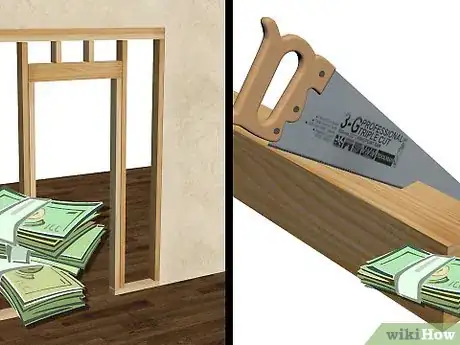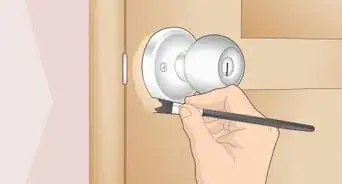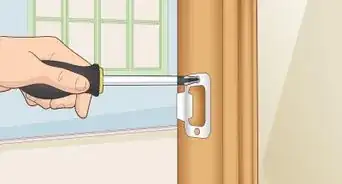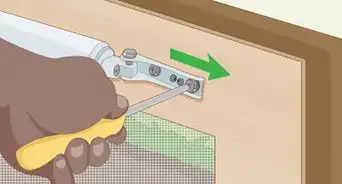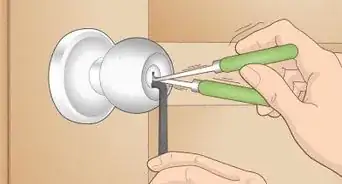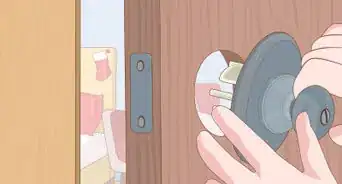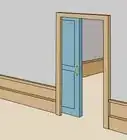This article was co-authored by Mark Spelman. Mark Spelman is a General Contractor based in Austin, Texas. With over 30 years of construction experience, Mark specializes in constructing interiors, project management, and project estimation. He has been a construction professional since 1987.
wikiHow marks an article as reader-approved once it receives enough positive feedback. This article received 18 testimonials and 90% of readers who voted found it helpful, earning it our reader-approved status.
This article has been viewed 989,344 times.
If you want to install a door in your house, you have to first frame the door opening to prepare it for the installation. With a ladder, some nails and a hammer, you're well on your way to outfitting your own rooms at a fraction of the cost.
Steps
Measuring and Cutting
-
1Decide whether to buy a frame or build one. Building your own door frame can save some money, provided you have the time, skills and tools to do the job correctly. If you are uncertain, it is usually much easier to buy a pre-made door frame assembly or prehung door unit. Usually such pre-made products are not much more expensive, and will save you time and potential headaches.
-
2Know what lumber to purchase. Determine the size of the framing members in the wall you are framing the door in. Wood studs are most often 2x4 nominal size, but 2x6 and other size studs are also used in residential framing. You can purchase the lumber you need at a lumberyard or home improvement warehouse store.[1]
- In terms of the best type of wood to use for the frame, feel free to choose lumber based on aesthetics rather than strength. Interior doors and frames are not exposed to the same harsh elements as exterior ones, so your main concern should be picking a type of wood that you like and which goes well with the door you're planning to hang on it.
- Common wood types used for interior frames are:
- Alder
- Fir
- Birch
- Pine (the most popular)
Advertisement -
3Determine the size of the door. Normal, single interior doors are 22" - 42" wide and 6' 8" tall. Take into consideration what types and sizes of items you will be placing in the room. For example if the door leads to a laundry area, make sure the door will be large enough to fit a washer and dryer through, and preferably 36" wide.[2]
-
4Determine the size of the door opening. The size of the door opening will vary depending on the size of the door you plan to install. A typical door opening is 2 inches (5.1 cm) wider than the door size being installed to allow for the thickness of the jamb material and shims to plumb the jamb.[3]
- Measure your door carefully and cut the opening to fit using a reciprocating saw.
- Make the opening the width of the door plus 2 inches (5.1 cm), and if additional studs are needed, a space for these, as well.
-
5Cut the studs and sole plate to the width required. Never cut a wall top plate! The boards secured in an upright position along the sides of the frame are referred to as studs., and are used to support the wall. The board that transverses the top of the studs is called the top plate.[4]
- To make the studs, measure the height of the door to be installed. Cut 2x4s to the height of the door plus 1 1/2 inches (5.1 cm) to allow room for the top of the frame and allowance for leveling the jamb.
- To make the door header, cut 2x4s to the width of the original opening.
- A "king stud" is one that runs continuously from the top plate (usually a double plate) to the bottom plate.
- The "jack stud" is nailed to the king stud, but it's shorter as it supports the door header.
-
6Cut the door header. To make the door header (the top of the door frame), cut two 2x4s to the same length as the width of the original opening and nail them securely together. [5]
- You will need to add 1/2" of plywood between the 2x4's to get the right wall thickness of 3-1/2". This is the actual thickness of a 2x4.
Putting It Together
-
1Insert the top plate. Nail the top plate through the ceiling into the ceiling joists or blocking using 12D nails.
-
2Insert the sole plate. Nail the sole plate to the floor, driving the nails into the floor joists or blocking.[6]
- Don't nail the sole plate to the floor between the jack stud locations because this portion of the plate will be removed before the door is installed.
- Use Tapcon screws (or other appropriate fastener) to insert the sole plate.
-
3Nail the king studs in place. Use 12D nails to nail the king studs in place. Drive the nails at an angle to make a toe-nailed joint, or you can attach the studs with metal connectors.[7]
-
4Nail the jack studs to the king studs. Position the jack studs against the inside of the king studs, and nail them in place.
-
5Insert the header. Take two 2x4s that are cut to a length that equals the width of the original door opening. Use them to make a header that will sit above the door. Once in position, nail these header pieces together to secure. The header should fit between the king studs and sit snugly atop the jack studs.
-
6Insert a cripple stud. Measure and cut one (or two depending on the width of your door) studs to fit between the header and the top plate. This is a cripple stud. Use a toenail to secure the cripple studs to both the header below them and to the plate above them.
-
7Remove the sole plate. Saw through the 2x4 sole plate at the inside edges of the jack studs. Remove the cut portion of the plate.
Expert Q&A
-
QuestionCan I do it without using jack studs?
 Mark SpelmanMark Spelman is a General Contractor based in Austin, Texas. With over 30 years of construction experience, Mark specializes in constructing interiors, project management, and project estimation. He has been a construction professional since 1987.
Mark SpelmanMark Spelman is a General Contractor based in Austin, Texas. With over 30 years of construction experience, Mark specializes in constructing interiors, project management, and project estimation. He has been a construction professional since 1987.
Construction Professional Never, the jack stud is what the header rests on and is meant to carry the weight.
Never, the jack stud is what the header rests on and is meant to carry the weight. -
QuestionHow do I fix an out of square door frame?
 Mark SpelmanMark Spelman is a General Contractor based in Austin, Texas. With over 30 years of construction experience, Mark specializes in constructing interiors, project management, and project estimation. He has been a construction professional since 1987.
Mark SpelmanMark Spelman is a General Contractor based in Austin, Texas. With over 30 years of construction experience, Mark specializes in constructing interiors, project management, and project estimation. He has been a construction professional since 1987.
Construction Professional To fix an out of square door frame, it would be easier to adjust the door at the hinges if you can.
To fix an out of square door frame, it would be easier to adjust the door at the hinges if you can. -
QuestionHow do you trim a door frame if the opening is all the way to the ceiling?
 Mark SpelmanMark Spelman is a General Contractor based in Austin, Texas. With over 30 years of construction experience, Mark specializes in constructing interiors, project management, and project estimation. He has been a construction professional since 1987.
Mark SpelmanMark Spelman is a General Contractor based in Austin, Texas. With over 30 years of construction experience, Mark specializes in constructing interiors, project management, and project estimation. He has been a construction professional since 1987.
Construction Professional I would just install a 1x4 right to the ceiling.
I would just install a 1x4 right to the ceiling.
References
- ↑ https://www.lowes.com/n/buying-guide/lumber-buying-guide
- ↑ https://www.bobvila.com/articles/standard-size-for-doors/
- ↑ https://ezhangdoor.com/door-rough-opening-sizes-and-charts/
- ↑ https://www.finehomebuilding.com/pdf/021158074.pdf
- ↑ https://www.doityourself.com/stry/how-to-frame-an-exterior-door-opening-part-1#b
- ↑ https://www.popularmechanics.com/home/interior-projects/how-to/a1280/install-a-pocket-door/
- ↑ http://www.homedepot.com/c/framing_a_door_opening_HT_PG_DW
About This Article
To frame a door opening, start by nailing the top plate through the ceiling or ceiling joists and the sole plate into the floor. After that, you'll need to nail the longest boards in between the doorway and nail the smaller boards onto the bigger boards. Next, insert the header that will sit above the door and secure it by nailing the smallest boards between the header and the top plate. Finally, remove the sole plate by sawing through it at at the inside edges of the doorway. For more advice from our Home Improvement reviewer, including how to decide whether to build a door frame or buy one, read on!
